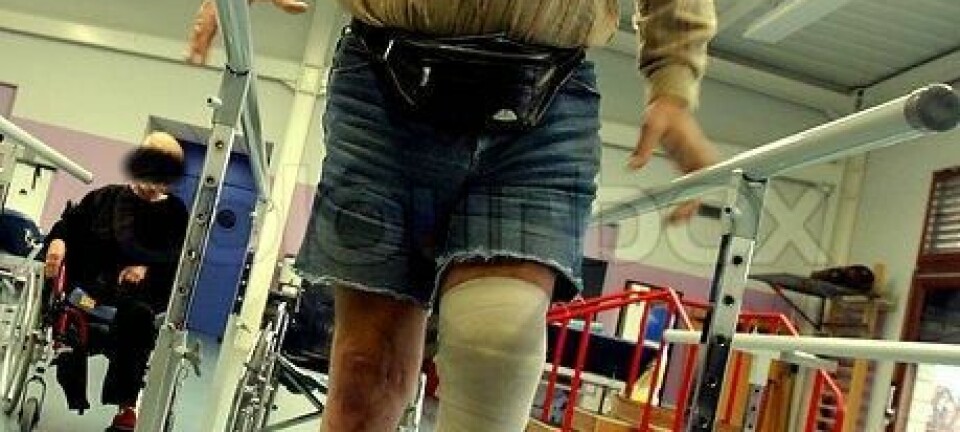
You can become hypersensitive to pain
Prolonged pain in e.g. the knees can make your central nervous system extra sensitive, so that the pain remains even after the cause of the pain is gone.
Patients with knee osteoarthritis have reduced functional capacity and muscle function. This means they can neither play football nor go for long walks, either because they have sustained a severe acute injury or because arthritis has taken its toll on the knee.
Many knee patients experience pain in their knee even after two knee operations designed to remove the pain.
In many cases, the second one of these operations is redundant. A new study shows that if you suffer prolonged pain from e.g. knee osteoarthritis, you may be so unlucky as to become sensitised to pain.
This means that your pain lingers on even after the surgeons have removed the cause of the pain.
It is extremely important that we have now found a possible cause of why patients continue to feel pain after two knee operations. At this stage it is not necessarily the knee that causes the pain. It may be that there has been a change in the sensitivity of the central nervous system.
“It is extremely important that we have now found a possible cause of why patients continue to feel pain after two knee operations. At this stage it is not necessarily the knee that causes the pain. It may be that there has been a change in the sensitivity of the central nervous system,” says Professor Thomas Graven-Nielsen of Aalborg University, Denmark, who was one of the researchers behind the new study, which is published in the journal Pain.
Recurrent pain activates the central nervous system
Prolonged, recurrent pain in the knee can cause our central nervous system (CNS) to become a little too sensitive to e.g. tenderness elsewhere in the body – pains which would not have felt like a big burden had we not suffered the initial knee injury.
The researchers carried out two studies to reach their conclusions about pain sensitisation.
They examined a mechanism that is particularly sensitive to changes in the pain system. The participants were exposed to repeated and regular pressure from a pressure cuff, normally used for blood pressure assessments, which was repeatedly inflated for 1-2 seconds so that it applied pressure around the leg. This method induces pain, and thus informs the researchers that the CNS has been activated.
If you have a patient who has become sensitised to pain, then maybe the patient should not undergo a second operation. Either because the hypersensitivity explains it or because the operation triggers even more pain stimuli that can sustain the hypersensitivity change.
”If you prick yourself repeatedly with a needle in the same place and at the same pressure, the intensity of the pain will increase,” says Graven-Nielsen.
“This happens because the brain or the spinal cord, also known as the CNS, is where the pain is accumulated, as opposed to in the local nerves in muscles and joints.”
Pain altered the CNS
In a preliminary experiment, the researchers used 15 healthy test subjects. Their CNS was activated with repeated pain signals and then the intensity of the pain was measured. The pain experience was aggravated when it was accompanied by knee pain.
“This shows that people with knee pains can experience a sensitisation of their pain system, and this experiment was the first step towards understanding that knee pain can cause these changes in our CNS. It shows that the pains did not only have a local effect,” says the professor.
In other words, the pain signals altered the pain registration far away from the local nerves, i.e. in the CNS.
Prolonged pain makes patients more sensitive
In another experiment, the researchers examined knee patients who had undergone osteoarthritis surgery. The patients had felt pain after the first operation and had therefore had a revision operation. Twenty of them reported that they no longer felt any pain. The other 20 did not benefit from the operation and continued to feel pain.
Both groups were asked about their experience with pain. The group that benefitted from the operation estimated that the pain, after repeated pressure stimulation around the leg, was not as intense as that reported by the group which did not benefit from the operation. If subjects in the latter group still felt pain in the knee, the pain from repeated pressure stimulation was more intense.
The researchers used the same method for activating the CNS as in the preliminary experiment. Here, patients with recurrent knee pains were also much more sensitive to pain elsewhere in the body.
This means that the second operation most likely had no effect on these patients. The patients appeared to have become sensitised to pain.
New pains may preserve hypersensitivity
Graven-Nielsen says that the new findings may make it possible in the future to screen patients with chronic pain to determine whether there is any use in removing a possible cause of the pain through an operation.
“If you have a patient who has become sensitised to pain, then maybe the patient should not undergo a second operation. Either because the hypersensitivity explains it or because the operation triggers even more pain stimuli that can sustain the hypersensitivity change.”
The researchers cannot as yet say whether the hypersensitive CNS is a permanent condition or whether it can be improved in the long term. They also cannot explain why some patients develop this hypersensitivity and others do not.
They do, however, know that additional pain after e.g. an operation can preserve the hypersensitivity in those who are unfortunate enough to suffer from it.
----------------------
Read the Danish version of this article at videnskab.dk
Translated by: Dann Vinther
Scientific links
- "Experimental Knee Pain Evoke Spreading Hyperalgesia and Facilitated Temporal Summation of Pain", DOI: 10.1111
- "Widespread sensitization in patients with chronic pain after revision total knee arthroplasty", DOI: 10.1016










